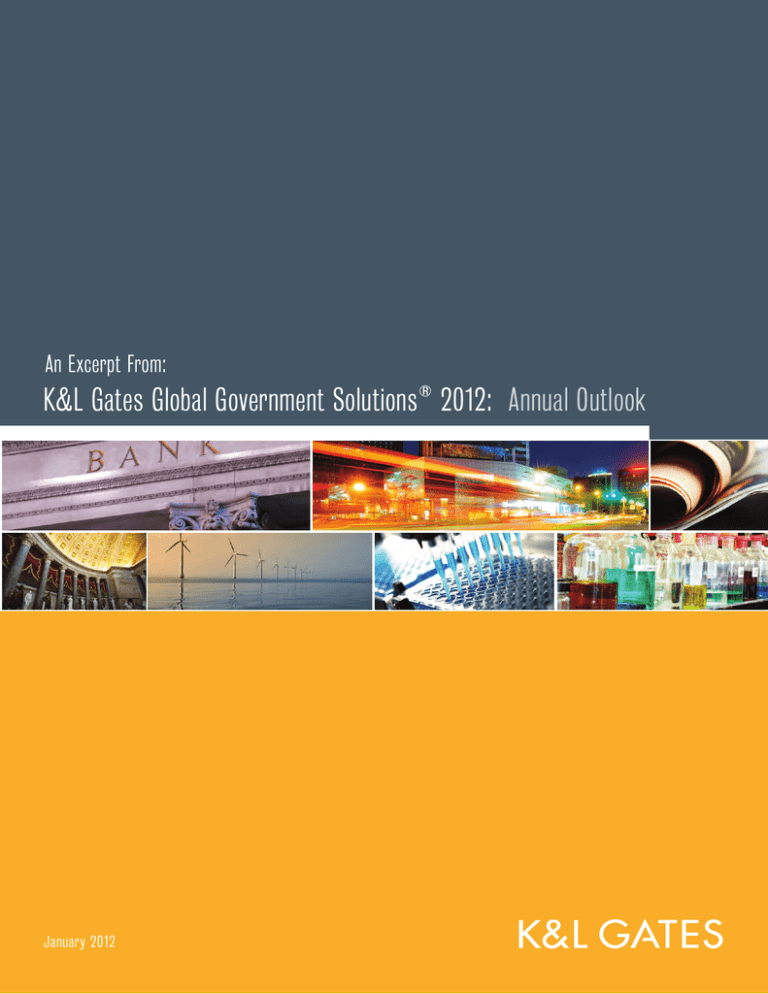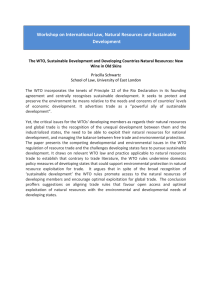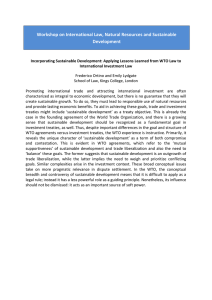
An Excerpt From:
K&L Gates Global Government Solutions ® 2012: Annual Outlook
January 2012
International Trade
Russia’s Accession to the WTO
Until recently, Russia was the largest economy not included within the World Trade
Organization (WTO). On November 10, 2011, after 18 years of discussion, the
terms of Russia’s accession were approved by the WTO’s 62-member Working
Party on the Accession of the Russian Federation. At the December 15-17, 2011,
Ministerial Conference the documents were approved, and Russia became a
WTO member. The chief Russian negotiator with the WTO, Maxim Medvedkov,
expects that the Russian Parliament will ratify the accession package by midsummer 2012.
The accession package includes the
report of the Working Party, which
outlines Russia’s trade regime and
commitments on legislative harmonization
and enforcement, and assesses their
compliance with the WTO rules.
The package also includes a list of
commitments to be made by Russia
for opening its markets in goods and
services. The documents summarize
and reflect the bilateral agreements
that already exist between Russia and
individual WTO member states on
market access for services (with 30 WTO
members) and on market access for
goods (with 57 WTO members). As part
of the accession process, Russia has also
committed to enact new laws and amend
existing legislation to bring all of its trade-
32
related laws into conformity with WTO
rules, including, for example, federal laws
“On the Fundamental Principles of State
Regulation of Foreign Trade Activity,” “On
Special Protective, Antidumping, and
Compensatory Measures Related to the
Import of Goods,” “On the Circulation
of Medicines,” and, of particular note,
Part IV of the Civil Code of the Russian
Federation, which regulates intellectual
property rights.
Russia’s WTO Commitments
Russia has committed to fully apply all
WTO rules and provisions from the
date of its accession, although there are
transitional periods with respect to certain
specified provisions. These commitments
include the following.
K&L Gates Global Government Solutions ® 2012 Annual Outlook
Import Tariffs and Tariff Rate Quotas
From the date of accession, Russia has
agreed to reduce more than one-third of
its national tariffs, with another quarter
of tariffs to be reduced three years later.
For some “essential” products, however,
Russia has insisted on a longer transitional
period of 5-7 years. Average maximum
import tariffs will be reduced from 10
to 7.8 percent, with average tariffs on
agricultural products to be reduced from
13.2 to 10.8 percent, and average
tariffs on manufactured products are set
to fall from 9.5 to 7.3 percent. Tariff-rate
quotas (TRQs) will remain for beef, pork,
and poultry as the Russian government
intends to protect domestic agricultural
companies. According to the Ministry of
Economic Development, the term of TRQs
for beef and poultry products has not
been set, but the TRQs for pork will be
replaced by a flat top rate of 25 percent
as of January 1, 2020.
Services Markets
In accordance with WTO rules, Russia
has agreed to remove certain barriers
for foreign investments in 116 service
sectors (out of 155 sectors under the
International Trade
Russia has committed to enact new laws and amend existing legislation to bring all of its
trade-related laws into conformity with WTO rules.
WTO classification). The bulk of these
commitments will result in no changes
to the existing regulations, except with
regard to the insurance sector, where the
total quota for foreign participation in the
sector will be increased from 25 to 50
percent, and the 49 percent restriction
on foreign ownership of companies
engaged in life insurance and mandatory
insurance (which includes mandatory
medical insurance and minimum liability
coverage for owners of automobiles) will
be raised to 51 percent from the date of
accession, and canceled altogether after
five years.
Subsidies
Russia has agreed to limit agricultural
subsidies to no more than $9 billion
in 2012 and will subsequently reduce
these to an annual limit of $4.4 billion
by 2018. Russia has also agreed that
annual agricultural subsidies for certain
specified products should total no more
than 30 percent of total agricultural
support to avoid excessive concentration
of government support for particular
products. With regard to the industrial
sector, Russia agreed to reduce or
modify subsidies so that they are not
contingent upon either export or the use
of domestic goods in favor of imports.
Customs Union
WTO Plurilateral Trade Agreements
The 2010 Customs Union created among
Russia, Kazakhstan, and Belarus will be
unaffected by Russia’s accession to the
WTO, as it was created in compliance
with the WTO rules. It is expected
the WTO will officially recognize the
Customs Union when Kazakhstan and
Belarus ultimately join the WTO. Certain
other CIS countries have indicated their
intention to join the union.
It is expected that, as part of the
integration process, Russia will indicate
its intention to join the WTO Government
Procurement Agreement. This agreement
regulates all rules and procedures
associated with tendering for public
procurement. Implementation of this
agreement will require the Russian
government to award public contracts
for procurement of goods and services,
according to commercial considerations,
without distinguishing between foreign
and domestic suppliers.
Transparency
Russia has agreed to provide
transparency with regard to its regulation
of foreign trade. All legislation regulating
trade will be published in official
sources and will not take effect prior
to that time. In addition, when drafting
new regulations, Russia will provide
all interested parties a reasonable
opportunity to submit comments on newly
proposed regulations before they are
adopted. These rules will also apply
to legislation of the Customs Union,
providing the opportunity for WTO
members to comment to the competent
Customs Union Body.
The WTO currently unites 154 member
states, which together account for 95
percent of world trade turnover. It is
estimated that Russia’s accession to the
WTO will result in GDP growth of 1.2
percent and $20 billion in absolute
figures. Russia’s accession will thus not
only result in tremendous benefits for the
Russian people, but will also present
enhanced opportunities for foreign
investment in Russia.
William M. Reichert (Moscow)
william.reichert@klgates.com
Anna V. Ryabtseva (Moscow)
anna.ryabtseva@klgates.com
K&L Gates Global Government Solutions ® 2012 Annual Outlook
33
Anchorage Austin Beijing Berlin Boston Brussels Charleston Charlotte Chicago Dallas Doha Dubai Fort Worth Frankfurt Harrisburg
Hong Kong London Los Angeles Miami Moscow Newark New York Orange County Palo Alto Paris Pittsburgh Portland Raleigh
Research Triangle Park San Diego San Francisco São Paulo Seattle Shanghai Singapore Spokane Taipei Tokyo Warsaw Washington, D.C.
K&L Gates includes lawyers practicing out of 40 offices located in North America, Europe, Asia, South America,
and the Middle East, and represents numerous GLOBAL 500, FORTUNE 100, and FTSE 100 corporations, in
addition to growth and middle market companies, entrepreneurs, capital market participants and public sector
entities. For more information about K&L Gates or its locations and registrations, visit www.klgates.com.
This publication is for informational purposes and does not contain or convey legal advice. The information herein should not be used or relied upon in regard to
any particular facts or circumstances without first consulting a lawyer.
©2012 K&L Gates LLP. All Rights Reserved.






